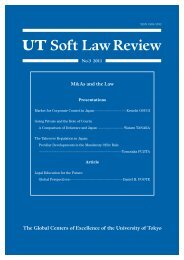UT Soft Law Review
UT Soft Law Review
UT Soft Law Review
You also want an ePaper? Increase the reach of your titles
YUMPU automatically turns print PDFs into web optimized ePapers that Google loves.
<strong>UT</strong> <strong>Soft</strong> <strong>Law</strong> <strong>Review</strong> No.2 2010activities. If companies want to introduce reasonable defensive measures corresponding totheir own situations, it will become necessary for them to make efforts to solve these problemsrelated to general shareholder meetings.(3) (Page 3) In the cases where directors exercise their authority granted in accordance with corporatelaw for a primary purpose other than maintaining and securing the control of the company(for instance, issuing shares to a third party for the purpose of raising funds, buyingback shares as part of the legitimate capital policy, or taking actions as part of business activitiesthat had been determined before a contest for control of the company arises), theseactions are outside the scope of the principle of protecting shareholder interests, even if theirpurpose is not that of protecting shareholders’ interests and such actions result in changes tothe ownership structure.(4) (Page 4) The Tokyo High Court in its ruling on the Nippon Broadcasting System case onMarch 23, 2005 pointed out that the following four types of takeovers are “cases of exploitinga company”:(i) The case where the acquirer accumulates the target shares for the purpose of makingthe concerned parties of the company buy back the shares at a higher price by drivingup share prices, though there exists no true intention of participating in managementof the company (the case of the so-called greenmailer);(ii) The case where the acquirer accumulates the target shares for the purpose of an abusiveacquisition, such as temporarily taking control of management of the company andtransferring assets necessary for business operations of the target, such as intellectualproperty, know-how, confidential business information, and information as for majorclients and customers, to the said acquirer or its group companies;(iii) The case where the acquirer accumulates the target shares in order to pledge the target’sassets as collateral for debts of the acquirer or its group companies or as funds forrepaying such debts, after taking control of the company; or(iv) The case where the acquirer accumulates the target shares for the purpose of temporarilytaking control of management of the company so as to dispose of high-valueassets, etc. such as real estate and negotiable securities that are currently not relatedto the company’s businesses and pay temporarily high dividends out of proceeds fromthe disposition, or sell the shares at a higher price because share prices have risen rapidlydue to temporarily high dividends(5) (Page 9 and page 12) A proxy contest, i.e., a mechanism to allow shareholders to decidewhether to terminate takeover defense measures through the exercise of voting rights in theelection of directors will be used more efficiently if combined with a takeover bid (TOB). Theacquirer tries to appeal to shareholders with the price offered by means of the TOB, and witha new management team by means of the proxy contest. In addition, the additional expenseneeded for a proxy contest can be effectively limited if it is combined with a TOB. Withregard to this point, it has been pointed out that it is difficult to conduct a TOB in parallelwith a proxy battle at companies that have introduced takeover defense measures, since theconditions of withdrawal of TOBs are inflexible under TOB regulations in Japan.88





